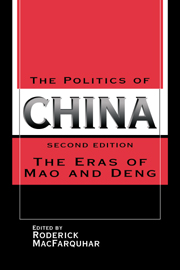Book contents
- Frontmatter
- Contents
- Preface
- List of tables and maps
- List of abbreviations
- Introduction
- 1 The establishment and consolidation of the new regime, 1949–57
- 2 The Great Leap Forward and the split in the Yan'an leadership, 1958–65
- 3 The Chinese state in crisis, 1966–9
- 4 The succession to Mao and the end of Maoism, 1969–82
- 5 The road to Tiananmen: Chinese politics in the 1980s
- 6 Reaction, resurgence, and succession: Chinese politics since Tiananmen
- Appendixes: Leaders and meetings
- References
- Index
4 - The succession to Mao and the end of Maoism, 1969–82
Published online by Cambridge University Press: 05 June 2012
- Frontmatter
- Contents
- Preface
- List of tables and maps
- List of abbreviations
- Introduction
- 1 The establishment and consolidation of the new regime, 1949–57
- 2 The Great Leap Forward and the split in the Yan'an leadership, 1958–65
- 3 The Chinese state in crisis, 1966–9
- 4 The succession to Mao and the end of Maoism, 1969–82
- 5 The road to Tiananmen: Chinese politics in the 1980s
- 6 Reaction, resurgence, and succession: Chinese politics since Tiananmen
- Appendixes: Leaders and meetings
- References
- Index
Summary
INTRODUCTION
The Great Proletarian Cultural Revolution was an attempt to shape the future of China. Its method was to change the nature of the Chinese people. It was to be a “great revolution that touches people to their very souls.” The masses were to liberate themselves by class struggle against the main target, “those within the Party who are in authority and are taking the capitalist road.” These so-called Soviet-style revisionists were alleged to be seeking to corrupt the masses by using old ideas to restore capitalism. By transforming the ideological realm – education, literature, the arts – and embracing Mao Zedong Thought, the Chinese people were to inoculate themselves against poisonous contagion.
Mao's objective was a China that was pure though poor, more egalitarian and less privileged, more collectivist but less bureaucratic, a society in which all worked as one, not so much because they were led by the Communist Party (CCP) as because an inner compass – Mao Zedong Thought – pointed them toward the magnetic pole of true communism.
The goal of the Cultural Revolution was to provide the right answer to the question, After Mao, what? But success would depend on the answer to an earlier question, After Mao, who? If alleged capitalist-roaders like head of state Liu Shaoqi survived the Chairman in positions of power, then China would “change its color.” China must not only be guided by the correct line and policies, but had to “train and bring up millions of successors who will carry on the cause of proletarian revolution.”
- Type
- Chapter
- Information
- The Politics of ChinaThe Eras of Mao and Deng, pp. 248 - 339Publisher: Cambridge University PressPrint publication year: 1997
- 4
- Cited by



